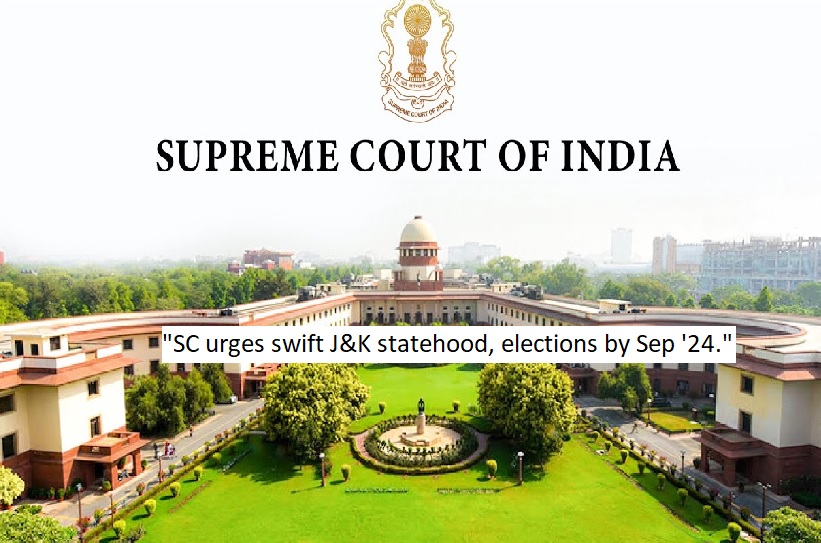


On the 11th of December 2023, the Supreme Court of India issued a significant directive to the Union Government, urging an expeditious process for the reinstatement of statehood to Jammu and Kashmir, excluding the Union Territory of Ladakh. The directive came from a Constitution Bench led by Chief Justice of India DY Chandrachud, with the bench comprising Justices Sanjay Kishan Kaul, Sanjiv Khanna, BR Gavai, and Surya Kant.
The central focus of the Supreme Court's directive was on the restoration of statehood to Jammu and Kashmir, a region that had witnessed a significant constitutional change in 2019 when its special status was revoked and it was reorganized into two separate Union Territories – Jammu and Kashmir, and Ladakh. The decision to bifurcate the state and downgrade its status was a consequential move by the Union Government, and it has since sparked varied reactions and discussions.
The Constitution Bench, in its directive, underscored the need for a swift and efficient process in bringing back statehood to Jammu and Kashmir while explicitly excluding Ladakh from this restoration. The court's emphasis on the exclusion of Ladakh indicated a nuanced approach, recognizing the unique administrative and geopolitical status of the region.
Chief Justice DY Chandrachud, along with Justices Kaul, Khanna, Gavai, and Kant, collectively upheld the validity of the Union Government's decision in 2019. This decision, which altered the constitutional landscape of Jammu and Kashmir, had been a subject of legal scrutiny and public debate. The Supreme Court's validation of this decision affirmed the constitutional authority of the Union Government in matters of reorganization and reclassification of states and territories.
The Court's pronouncement carried weight not only due to the significance of the issue at hand but also because it emanated from a Constitution Bench, the highest judicial authority in India. The diverse composition of the bench, comprising seasoned judges with varied legal perspectives, lent credibility to the decision.
The directive's underlying implication was not merely confined to the reinstatement of statehood. It also touched upon the broader theme of political and democratic processes. The Court, in its wisdom, emphasized the importance of democratic governance in Jammu and Kashmir by urging the Union Government to conduct elections to the Jammu and Kashmir Assembly by September 2024. This timeline set by the Court added a sense of urgency, signaling the need for a prompt return to normalcy in the political landscape of the region.
The directive, therefore, served as a comprehensive roadmap for the future of Jammu and Kashmir – from the reinstatement of statehood to the democratic exercise of conducting elections. It was a call for a holistic and timely resolution, acknowledging the aspirations of the people of the region while respecting the constitutional framework within which such decisions are made.
In conclusion, the Supreme Court's directive on the 11th of December 2023 marked a crucial juncture in the ongoing narrative of Jammu and Kashmir's constitutional status. It underscored the significance of a balanced and nuanced approach, recognizing the unique circumstances of the region. As the Union Government embarks on the journey of restoring statehood and organizing elections, the Court's directive serves as a guiding beacon, ensuring that the principles of democracy and constitutional governance remain paramount in shaping the destiny of Jammu and Kashmir.
TAGS: Justices Sanjay Kishan Kaul Sanjiv Khanna BR Gavai Surya Kant Union Government 2019 decision Special status